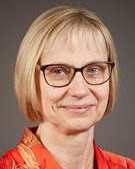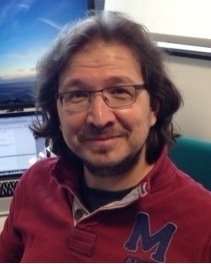Archives: Committee Members
Piero Cosseddu
Pedro Barquiña
Pedro Barquinha, PhD in Nanotechnologies and Nanosciences, NOVA University Lisbon (2010). He is an Associate Professor at the Materials Science Department of NOVA Science and Technology School (FCT-NOVA) and coordinator of the Doctoral program in Nanotechnologies and Nanosciences of the same university. He has been working in oxide electronics since 2004, participating in >30 national and international research projects in the area, with academia and industry. His expertise is on multicomponent oxide thin films and their application in thin film transistors and flexible electronics. More recently he started to work with 1D multicomponent oxide nanostructures at low temperature and their integration in nanotransistors and nanogenerators to create smart surfaces, running an ERC Starting Grant (TREND) on this topic. He is co-author of >150 peer-reviewed papers (h-index=43, as April 2020), 7 books and book chapters in the area of oxide electronics.
Benjamin Tee
Dr. Benjamin C.K. Tee is appointed President’s Assistant Professor in Materials Science and Engineering Department at the National University of Singapore (NUS). He obtained his PhD (EE) at Stanford University, and was a Singapore-Stanford Biodesign Global Innovation Postdoctoral Fellow in 2014. He has developed and patented several award-winning electronic skin sensor technologies. He is an MIT TR35 Innovator (Global) in 2015 and Singapore National Research Foundation (NRF) Fellow. His research group aims to develop technologies at the intersection of materials science, mechanics, electronics and biology, with a focus on sensitive electronic skins that has tremendous potential to advance global healthcare technologies in an increasingly Artificial Intelligence (AI) and Robotics driven era. He can be reached at www.benjamintee.com.
Helena Gleskova
Helena Gleskova received M.S. and Ph.D. degrees in solid-state physics from Comenius University, Bratislava, Slovakia. In 1992 she was appointed as Assistant Professor in the Department of Solid State Physics, Faculty of Mathematics and Physics, Comenius University, Bratislava, Slovakia. From 1993 until 2007 she held various research positions in the Department of Electrical Engineering of Princeton University, Princeton, USA. Here she contributed to the birth of flexible and printed electronics and held a position of the Director of Micro/Nano Fabrication Laboratory of the Princeton Institute for the Science and Technology of Materials. In 2008 she joined the Department of Electronic and Electrical Engineering University of Strathclyde, Glasgow, UK, where she holds positions of Senior Lecturer and Director of Graduate School. Her current research covers theoretical and experimental aspects of low-voltage organic transistors and sensors on plastic substrates, ferroelectric polymers, electro-chemical transistors, and textile sensors. Her publication portfolio contains 9 patent groups, 5 book chapters, and ~ 100 technical papers. She has about 2300 citations and h-index of 22. She is a Senior Member of IEEE and a member of the Material Research Society (MRS) and the Society for Information Display (SID).
Sanjiv Sambandan
Sanjiv Sambandan obtained his BTech in Electrical Engineering (Energy Systems) from the Indian Institute of Technology, Kharagpur, India in 2002 and PhD in Electrical and Computer Engineering from the University of Waterloo, Canada in 2006. From 2006-2010 he was with the Electronic Materials and Device Lab, Xerox Palo Alto Research Centre, California, USA. He is an Associate Professor at the Indian Institute of Science, Bangalore, India. He is also the founder and director of openwater.in, a clean water start up.
Dr Emre Ozer is a Principal Research Engineer and joined Arm Research in 2005. He received his PhD in the Department of Electrical and Computer Engineering at North Carolina State University in 2001. His research interests are energy-efficient CPUs, fault tolerance, embedded machine learning, bespoke hardware design and flexible electronics. He has published over 50 international conference/journal articles and holds over 25 US patents. He is currently the project coordinator of InnovateUK funded project PlasticARMPit.
Kris Myny received his PhD degree in electrical engineering from the KU Leuven, Leuven, Belgium, in 2013. He is now a Principal Member of Technical Staff and R&D Team Leader at imec, and part-time lecturer at KU Leuven. He specializes in circuit design for flexible thin-film transistor applications. His work has been published in numerous international journals and conferences, including Nature Electronics and several ISSCC contributions. He was listed as one of Belgium’s top tech pioneers by the business newspaper De Tijd and received in 2018 the European Young Researcher Award for design on thin-film electronics. In 2016 he also received a prestigious ERC Starting Grant from the European Commission to enable breakthrough research in thin-film transistor circuits (FLICs). He is now a member of the Young Academy of Belgium between 2019-2024.
Stephen Beeby
Professor Steve P Beeby obtained a BEng (Hons) degree in Mechanical Engineering from the Univeristy of Portsmouth, UK, in 1992. He obtained his PhD from the University of Southampton, UK, in 1998 on the subject of MEMS resonant sensors. He has been awarded two prestigious EPSRC Research Fellowships to investigate the combination of screen printed active materials with micromachined structures and textiles for energy harvesting. Following the first Fellowship, he became a lecturer in ECS, was appointed a Reader in 2008 and was awarded a personal Chair in 2011. His research interests include energy harvesting, e-textiles, MEMS and active printed materials development. He leads the UK’s E-Textiles Network and is Chair of the International Steering Committee for the PowerMEMS conference series. He is currently leading 3 UK funded research projects and has previously been principal or co-investigator on a further 18 projects and co-ordinated 2 European Union research projects. He has co-authored/edited four books including ‘Energy Harvesting for Autonomous Systems’ (Artec House, Inc., Boston, London, 2010). He has over 250 publications and 4 patents. He has an h-Index of 47 with >12800 citations. He is a co-founder of Perpetuum Ltd, a University spin-out based upon vibration energy harvesting formed in 2004 and Smart Fabric Inks Ltd.
Pritesh Hiralal
Dr. Pritesh Hiralal, studied Physics at Manchester and completed his Ph.D. in Engineering at the University of Cambridge. He has spent time in business in Spain and set up Casa Hiralal S.L. and Zendal Backup. He has spent time in industry at the Nokia Research Centre working on high power energy storage, and has published 40+ papers and 15+ patents in the field. He has consulted for materials as well as energy storage device companies. He spent time as a Research Associate as well as an adjunct lecturer at the University of Cambridge. For the last 4 years he has co-founded and is the CEO of Zinergy, developing thin, flexible batteries which have gone from lab demonstrator all the way to production, entering the market in 2020.


















